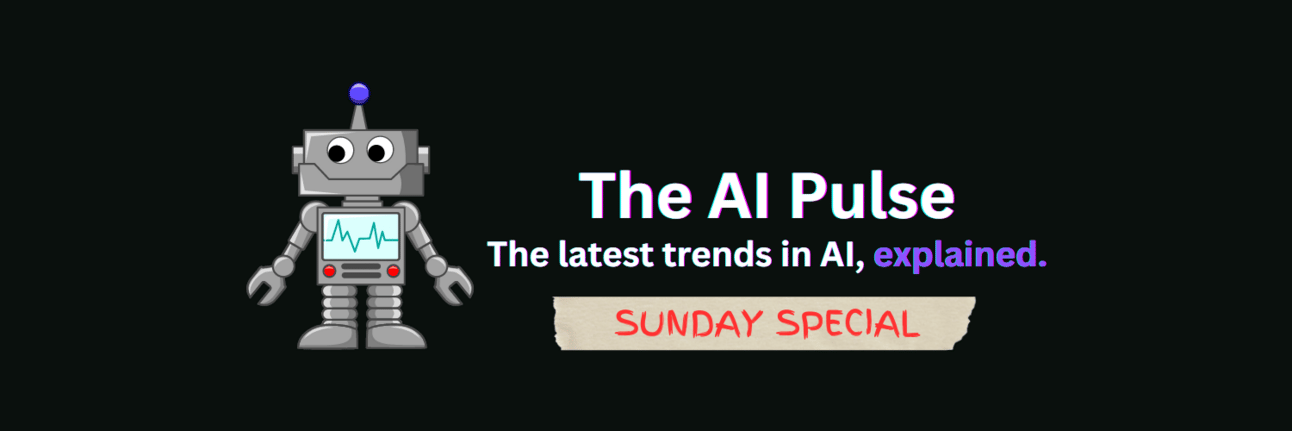
Welcome back AI prodigies!
In today’s Sunday Special:
📜The Prelude
🤖The Turing Test of Tunes
🎨Creativity and Emotion
🎸Genre
🔑Key Takeaway
Read Time: 6 minutes
🎓Key Terms
Anthropomorphism: giving human qualities to non-human things.
Experiments in Musical Intelligence (EMI): a computer program that analyzes musical styles and develops algorithms to create new songs.
🩺 PULSE CHECK
Do you care if music is AI-generated?
📜THE PRELUDE
It’s no secret that Generative AI (GenAI) has earned a seat at the table in many creative fields, including art, music, and poetry. AI-generated music is becoming increasingly popular, with various AI-powered tools that instantaneously compose anything from melodies to complete pieces of music. If you’re new here, you should know that this isn’t our first take on AI-generated music.
In late April 2024, we examined AI-generated music through a philosophical lens, first distinguishing music from noise and then classifying AI-generated music as a new category that leverages musical elements without the emotion-infused storytelling of traditional music. We wondered if the process of making music matters to most listeners, especially if they can’t tell the difference. Today, we’ll investigate how anthropomorphic and emotional elements and genres affect the perception of AI-generated music.
🤖THE TURING TEST OF TUNES
Perception plays a crucial role in how we respond to music. If an artist we aren’t so fond of releases a catchy song, we find ourselves irritated if we enjoy it. Similarly, research has shown that when listeners know a piece of music is AI-generated, they tend to like it less. This perception seems based on pre-held biases, which may stem from discomfort around non-human creativity, skepticism about authenticity, or a lack of emotional connection with the artist. Hearing music without knowing its composer can mitigate this bias, similar to how blind orchestra auditions allow judges to appreciate the music’s quality without considering the musician’s gender.
A similar study about the perception of AI-generated music confirmed these biases, where those who perceived an AI music generator as a traditional musician appreciated its songs more than those who didn’t. For those who accepted the AI music generator as a traditional musician, its composition fulfilled an attributed responsibility role, resulting in a positive attitude towards AI-generated music. On the other hand, those who didn’t recognize the AI music generator as a traditional musician showed doubts about the legitimacy of AI-generated music and, therefore, didn’t appreciate its existence or value.
Humans are more likely to embrace AI-generated music with anthropomorphic features, which aligns with previous research suggesting that familiarity breeds comfort. In this context, an anthropomorphic feature of AI-generated music is dynamic range and performance nuance. Human musicians don’t play with perfect consistency. They add subtle variations in volume, timing, and phrasing. AI-generated music can be designed to emulate these human imperfections, making the music feel more natural, authentic, and expressive.
🎨CREATIVITY AND EMOTION
Can robots be creative without humans? University of Montana (UM) researchers pitted OpenAI’s GPT-4 against college students in the Torrence Tests for Creative Thinking: a creative assessment that tests convergent and divergent thinking through various verbal and nonverbal tasks. OpenAI’s GPT-4 beat 99% of college students. The AI model read from the internet, remembered what it read, and somewhat generated the most likely words to follow each prior word.
Despite this impressive performance, OpenAI’s GPT-4 couldn’t apply creative outputs outside a narrow, controlled environment, lacking intuition, reason, and, most importantly, context. In a more practical sense, how does an AI model’s creativity affect an audience’s engagement with the output?
In the early 1980s, David Cope began developing “EMI”: Experiments in Musical Intelligence, in which he spent 30 years teaching computers how to generate music in the style of composers such as Johann Sebastian Bach. The revelation was met with anger and pushback from audiences, critics, and record labels. After this backlash, Cope created a successor called Emily Howell, focusing instead on composing novel works in a unique musical style. Some critics complained that Emily’s works, “though musically pleasing, were hollow, shallow, and lacking depth and heart.” In response, Cope offered a heartfelt defense:
“Most musicians, academics or composers, have always held this idea that the creation of music is innately human, and somehow this computer program was a threat in some way to that unique human aspect of creation,” Cope said. “I’ve always refuted that by saying a human built the machine, listened to the output, and chose what was the best. What’s less human about that than if I had taken years and years to just compose the whole thing myself?”
Despite the controversy, Cope’s work with AI-generated music continues to challenge traditional notions of creativity and authorship that we face today. Once trained with enough data, current AI music generators will be able to compose songs without human prompting. So, who holds the creative autonomy: the AI, the AI developer, the artists whose tunes trained the AI, or the human prompter? Interestingly, Dr. Marian Mazzone argues there’s no significant difference between humans and AI models with creativity since both fundamentally generate new ideas from old ones. While AI can mimic existing patterns to create something new, human creativity is unique because it’s driven by emotional depth, personal experience, and intention. Here, AI replicates the process of creativity, but the authenticity of human artistic expression remains distinct.
AI is not perceived to feel emotion or have personal experiences, which may contribute to its acceptance as an artist and its ability to evoke emotion in us. However, several studies have found that, when unaware of the music’s origin, participants exhibited similar emotional responses to both AI-generated and human-composed music, as measured by self-reported surveys after presenting both types of music.
However, outside the lab, aesthetic judgments aren’t a result of stimulus features alone; contextual information about the composer of a piece of music can influence aesthetic judgments of that music. Plus, you can’t go to a concert for an AI music generator. At least not yet.
🎸GENRE
A study by Daniel B. Shank of the Missouri University of Science and Technology (MUS&T) showed that participants were more likely to attribute an AI composer to electronic music as opposed to classical music. They hypothesized this was due to the “AI-sounding” nature of electronic music, which is more computerized. People have preexisting ideas of what AI music should sound like, and electronic music likely fits into their notions.
Participants were presented with classical music excerpts only to investigate this further, but the composer’s identity was manipulated as either human or AI. They found that those in the AI group rated the music as being significantly lower quality than those in the human or control group, which may change as AI music generators become more humanlike over time. Considering both of these findings, Shank proposes that as AI-composed music becomes more acceptable and genres and styles become more diverse, these stereotypes and biases may diminish.
🔑KEY TAKEAWAY
The rise of AI-powered music composition rivals human creativity, provoking a reevaluation of ownership and the very nature of artistic creation. At first glance, broad acceptance of AI-generated music requires hiding its creative identity. However, as with other technological developments, those who only know the world in which innovation exists normalize it. Generation Alpha will likely embrace AI-generated music as simply another facet of the artistic landscape.
📒FINAL NOTE
If you found this useful, follow us on Twitter or provide honest feedback below. It helps us improve our content.
How was today’s newsletter?
❤️TAIP Review of the Week
“This newsletter is too good to be true. It’s well-written, informative, and relevant. Keep up the great work. I’m rooting for y’all.”
REFER & EARN
🎉Your Friends Learn, You Earn!
{{rp_personalized_text}}
Refer 5 friends to enter 🎰July’s $200 Gift Card Giveaway.
Copy and paste this link to others: {{rp_refer_url}}
